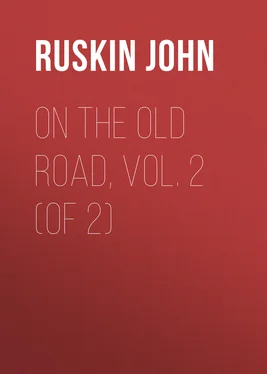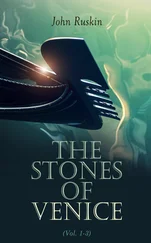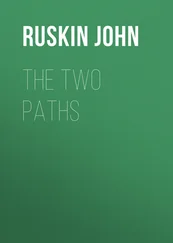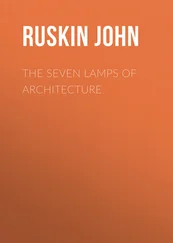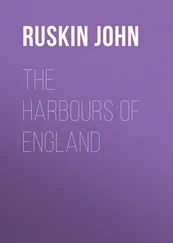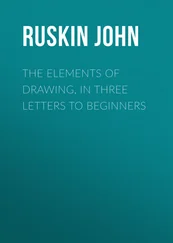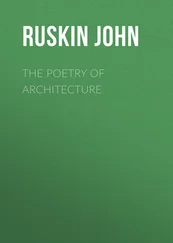John Ruskin - On the Old Road, Vol. 2 (of 2)
Здесь есть возможность читать онлайн «John Ruskin - On the Old Road, Vol. 2 (of 2)» — ознакомительный отрывок электронной книги совершенно бесплатно, а после прочтения отрывка купить полную версию. В некоторых случаях можно слушать аудио, скачать через торрент в формате fb2 и присутствует краткое содержание. Жанр: foreign_antique, foreign_home, literature_19, visual_arts, на английском языке. Описание произведения, (предисловие) а так же отзывы посетителей доступны на портале библиотеки ЛибКат.
- Название:On the Old Road, Vol. 2 (of 2)
- Автор:
- Жанр:
- Год:неизвестен
- ISBN:нет данных
- Рейтинг книги:3 / 5. Голосов: 1
-
Избранное:Добавить в избранное
- Отзывы:
-
Ваша оценка:
- 60
- 1
- 2
- 3
- 4
- 5
On the Old Road, Vol. 2 (of 2): краткое содержание, описание и аннотация
Предлагаем к чтению аннотацию, описание, краткое содержание или предисловие (зависит от того, что написал сам автор книги «On the Old Road, Vol. 2 (of 2)»). Если вы не нашли необходимую информацию о книге — напишите в комментариях, мы постараемся отыскать её.
On the Old Road, Vol. 2 (of 2) — читать онлайн ознакомительный отрывок
Ниже представлен текст книги, разбитый по страницам. Система сохранения места последней прочитанной страницы, позволяет с удобством читать онлайн бесплатно книгу «On the Old Road, Vol. 2 (of 2)», без необходимости каждый раз заново искать на чём Вы остановились. Поставьте закладку, и сможете в любой момент перейти на страницу, на которой закончили чтение.
Интервал:
Закладка:
The instruction which you would impart one would suppose would be beneficial to the laborer in the class which he is in?—Yes.
142. And that agrees, does it not, with what has been alleged by many working men, that they have found in their competition with foreigners that a knowledge of art has been most beneficial to them?—Quite so.
I believe many foreigners are now in competition with working men in the metropolis, in matters in which art is involved?—I believe there are many, and that they are likely still more to increase as the relations between the nations become closer.
Is it your opinion that the individual workman who now executes works of art in this country is less intellectually fit for his occupation than in former days?—Very much so indeed.
Have you not some proofs of that which you can adduce for the benefit of the Committee?—I can only make an assertion; I cannot prove it; but I assert it with confidence, that no workman, whose mind I have examined, is, at present, capable of design in the arts, only of imitation, and of exquisite manual execution, such as is unsurpassable by the work of any time or any country; manual execution, which, however, being wholly mechanical, is always profitless to the man himself, and profitless ultimately to those who possess the work.
143. With regard to those institutions in which pictures are exhibited, are you satisfied that the utmost facilities are afforded to the public compatibly with the expense which is now incurred?—I cannot tell how far it would be compatible with the expense, but I think that a very little increase of expense might certainly bring about a great increase of convenience.
Various plans have been suggested, by different persons, as to an improvement in the National Gallery, with regard to the area, and a better distribution of the pictures?—Yes.
Are you of opinion that at a very small cost it would be possible to increase the area considerably in the case of the National Gallery?—I have not examined the question with respect to the area of the National Gallery. It depends of course upon questions of rent, and respecting the mode in which the building is now constructed, which I have not examined; but in general this is true of large buildings, that expense wisely directed to giving facilities for seeing the pictures, and not to the mere show of the building, would always be productive of far more good to the nation, and especially to the lower orders of the nation, than expense in any other way directed, with reference to these institutions.
144. Some persons have been disposed to doubt whether, if the institutions were open at night, gas would be found injurious to the pictures; would that be your impression?—I have no doubt that it would be injurious to the pictures, if it came in contact with them. It would be a matter of great regret to me that valuable pictures should be so exhibited. I have hoped that pictures might be placed in a gallery for the working classes which would interest them much more than the chefs-d'œuvre of the great masters, and which at the same time would not be a great loss to the nation if destroyed.
145. Have you had any experience of the working of the evening openings of the South Kensington Museum?—No direct experience, but my impression is that the workmen at present being compelled to think always of getting as much work done in a day as they can, are generally led in these institutions to look to the machinery, or to anything which bears upon their trade; it therefore is no rest to them; it may be sometimes, when they are allowed to take their families, as they do on certain evenings, to the Kensington Museum, that is a great step; but the great evil is that the pressure of the work on a man's mind is not removed, and that he has not rest enough, thorough rest given him by proper explanations of the things he sees; he is not led by a large printed explanation beneath the very thing to take a happy and unpainful interest in every subject brought before him; he wanders about listlessly, and exerts himself to find out things which are not sufficiently explained, and gradually he tires of it, and he goes back to his home, or to his alehouse, unless he is a very intelligent man.
Would you recommend that some person should follow him through the building to explain the details?—No; but I would especially recommend that our institutions should be calculated for the help of persons whose minds are languid with labor. I find that with ordinary constitutions, the labor of a day in England oppresses a man, and breaks him down, and it is not refreshment to him to use his mind after that, but it would be refreshment to him to have anything read to him, or any amusing thing told him, or to have perfect rest; he likes to lie back in his chair at his own fireside, and smoke his pipe, rather than enter into a political debate, and what we want is an extension of our art institutions, with interesting things, teaching a man and amusing him at the same time; above all, large printed explanations under every print and every picture; and the subjects of the pictures such as they can enjoy.
146. Have you any other suggestion to offer calculated to enlighten the Committee on the subject intrusted to them for consideration?—I can only say what my own feelings have been as to my men. I have found particularly that natural history was delightful to them; I think that that has an especial tendency to take their minds off their work, which is what I always try to do, not ambitiously, but reposingly. I should like to add to what I said about the danger of injury to chefs-d'œuvre , that such danger exists, not only as to gas, but also the breath, the variation of temperature, the extension of the canvases in a different temperature, the extension of the paint upon them, and various chemical operations of the human breath, the chance of an accidental escape of gas, the circulation of variously damp air through the ventilators; all these ought not to be allowed to affect the great and unreplaceable works of the best masters; and those works, I believe, are wholly valueless to the working classes; their merits are wholly imperceptible except to persons who have given many years of study to endeavor to qualify themselves to discover them; but what is wanting for the working man is historical painting of events noble, and bearing upon his own country; the history of his own country well represented to him; the natural history of foreign countries well represented to him; and domestic pathos brought before him. Nothing assists him so much as having the moral disposition developed rather than the intellectual after his work; anything that touches his feelings is good, and puts new life into him; therefore I want modern pictures, if possible, of that class which would ennoble and refine by their subjects. I should like prints of all times, engravings of all times; those would interest him with their variety of means and subject; and natural history of three kinds, namely, shells, birds, and plants; not minerals, because a workman cannot study mineralogy at home; but whatever town he may be in, he may take some interest in the birds and in the plants, or in the sea shells of his own country and coast. I should like the commonest of all our plants first, and most fully illustrated; the commonest of all our birds, and of our shells, and men would be led to take an interest in those things wholly for their beauty, and for their separate charm, irrespective of any use that might be made of them in the arts. There also ought to be, for the more intelligent workman, who really wants to advance himself in his business, specimens of the manufactures of all countries, as far as the compass of such institutions would allow.
147. You have traveled, I believe, a good deal abroad?—Yes.
Читать дальшеИнтервал:
Закладка:
Похожие книги на «On the Old Road, Vol. 2 (of 2)»
Представляем Вашему вниманию похожие книги на «On the Old Road, Vol. 2 (of 2)» списком для выбора. Мы отобрали схожую по названию и смыслу литературу в надежде предоставить читателям больше вариантов отыскать новые, интересные, ещё непрочитанные произведения.
Обсуждение, отзывы о книге «On the Old Road, Vol. 2 (of 2)» и просто собственные мнения читателей. Оставьте ваши комментарии, напишите, что Вы думаете о произведении, его смысле или главных героях. Укажите что конкретно понравилось, а что нет, и почему Вы так считаете.
